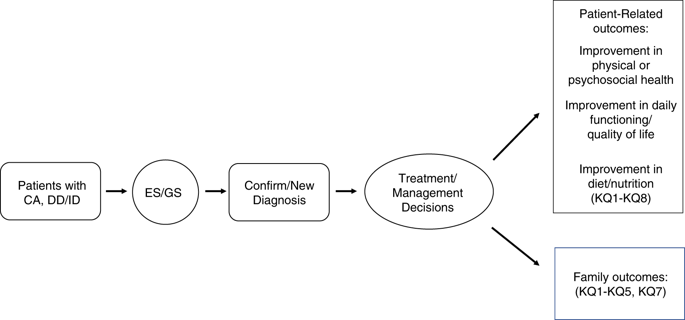当前位置:
X-MOL 学术
›
Genet. Med.
›
论文详情
Our official English website, www.x-mol.net, welcomes your feedback! (Note: you will need to create a separate account there.)
Systematic evidence-based review: outcomes from exome and genome sequencing for pediatric patients with congenital anomalies or intellectual disability.
Genetics in Medicine ( IF 8.8 ) Pub Date : 2020-03-23 , DOI: 10.1038/s41436-020-0771-z Jennifer Malinowski 1 , David T Miller 2 , Laurie Demmer 3 , Jennifer Gannon 4, 5 , Elaine Maria Pereira 6 , Molly C Schroeder 7 , Maren T Scheuner 8, 9 , Anne Chun-Hui Tsai 10 , Scott E Hickey 11 , Jun Shen 12 ,
Genetics in Medicine ( IF 8.8 ) Pub Date : 2020-03-23 , DOI: 10.1038/s41436-020-0771-z Jennifer Malinowski 1 , David T Miller 2 , Laurie Demmer 3 , Jennifer Gannon 4, 5 , Elaine Maria Pereira 6 , Molly C Schroeder 7 , Maren T Scheuner 8, 9 , Anne Chun-Hui Tsai 10 , Scott E Hickey 11 , Jun Shen 12 ,
Affiliation

|
PURPOSE
Exome and genome sequencing (ES/GS) are performed frequently in patients with congenital anomalies, developmental delay, or intellectual disability (CA/DD/ID), but the impact of results from ES/GS on clinical management and patient outcomes is not well characterized. A systematic evidence review (SER) can support future evidence-based guideline development for use of ES/GS in this patient population.
METHODS
We undertook an SER to identify primary literature from January 2007 to March 2019 describing health, clinical, reproductive, and psychosocial outcomes resulting from ES/GS in patients with CA/DD/ID. A narrative synthesis of results was performed.
RESULTS
We retrieved 2654 publications for full-text review from 7178 articles. Only 167 articles met our inclusion criteria, and these were primarily case reports or small case series of fewer than 20 patients. The most frequently reported outcomes from ES/GS were changes to clinical management or reproductive decision-making. Two studies reported on the reduction of mortality or morbidity or impact on quality of life following ES/GS.
CONCLUSION
There is evidence that ES/GS for patients with CA/DD/ID informs clinical and reproductive decision-making, which could lead to improved outcomes for patients and their family members. Further research is needed to generate evidence regarding health outcomes to inform robust guidelines regarding ES/GS in the care of patients with CA/DD/ID.
中文翻译:

系统性循证审查:先天性异常或智力障碍儿科患者的外显子组和基因组测序结果。
目的 外显子组和基因组测序 (ES/GS) 经常在先天性异常、发育迟缓或智力残疾 (CA/DD/ID) 的患者中进行,但 ES/GS 结果对临床管理和患者结局的影响并不大很好的表征。系统证据审查 (SER) 可以支持未来在该患者群体中使用 ES/GS 的循证指南制定。方法 我们进行了一项 SER,以确定 2007 年 1 月至 2019 年 3 月期间描述 CA/DD/ID 患者的 ES/GS 导致的健康、临床、生殖和心理社会结果的主要文献。对结果进行了叙述性综合。结果 我们从 7178 篇文章中检索到 2654 篇文章进行全文审查。只有 167 篇文章符合我们的纳入标准,这些主要是病例报告或少于 20 名患者的小型病例系列。ES/GS 最常报告的结果是临床管理或生殖决策的变化。两项研究报告了 ES/GS 后死亡率或发病率的降低或对生活质量的影响。结论 有证据表明,CA/DD/ID 患者的 ES/GS 可为临床和生殖决策提供信息,这可能会改善患者及其家庭成员的预后。需要进一步的研究来生成有关健康结果的证据,以便为 CA/DD/ID 患者护理中有关 ES/GS 的强有力指南提供信息。两项研究报告了 ES/GS 后死亡率或发病率的降低或对生活质量的影响。结论 有证据表明,CA/DD/ID 患者的 ES/GS 可为临床和生殖决策提供信息,这可能会改善患者及其家庭成员的预后。需要进一步的研究来生成有关健康结果的证据,以便为 CA/DD/ID 患者护理中有关 ES/GS 的强有力指南提供信息。两项研究报告了 ES/GS 后死亡率或发病率的降低或对生活质量的影响。结论 有证据表明,CA/DD/ID 患者的 ES/GS 可为临床和生殖决策提供信息,这可能会改善患者及其家庭成员的预后。需要进一步的研究来生成有关健康结果的证据,以便为 CA/DD/ID 患者护理中有关 ES/GS 的强有力指南提供信息。
更新日期:2020-04-24
中文翻译:

系统性循证审查:先天性异常或智力障碍儿科患者的外显子组和基因组测序结果。
目的 外显子组和基因组测序 (ES/GS) 经常在先天性异常、发育迟缓或智力残疾 (CA/DD/ID) 的患者中进行,但 ES/GS 结果对临床管理和患者结局的影响并不大很好的表征。系统证据审查 (SER) 可以支持未来在该患者群体中使用 ES/GS 的循证指南制定。方法 我们进行了一项 SER,以确定 2007 年 1 月至 2019 年 3 月期间描述 CA/DD/ID 患者的 ES/GS 导致的健康、临床、生殖和心理社会结果的主要文献。对结果进行了叙述性综合。结果 我们从 7178 篇文章中检索到 2654 篇文章进行全文审查。只有 167 篇文章符合我们的纳入标准,这些主要是病例报告或少于 20 名患者的小型病例系列。ES/GS 最常报告的结果是临床管理或生殖决策的变化。两项研究报告了 ES/GS 后死亡率或发病率的降低或对生活质量的影响。结论 有证据表明,CA/DD/ID 患者的 ES/GS 可为临床和生殖决策提供信息,这可能会改善患者及其家庭成员的预后。需要进一步的研究来生成有关健康结果的证据,以便为 CA/DD/ID 患者护理中有关 ES/GS 的强有力指南提供信息。两项研究报告了 ES/GS 后死亡率或发病率的降低或对生活质量的影响。结论 有证据表明,CA/DD/ID 患者的 ES/GS 可为临床和生殖决策提供信息,这可能会改善患者及其家庭成员的预后。需要进一步的研究来生成有关健康结果的证据,以便为 CA/DD/ID 患者护理中有关 ES/GS 的强有力指南提供信息。两项研究报告了 ES/GS 后死亡率或发病率的降低或对生活质量的影响。结论 有证据表明,CA/DD/ID 患者的 ES/GS 可为临床和生殖决策提供信息,这可能会改善患者及其家庭成员的预后。需要进一步的研究来生成有关健康结果的证据,以便为 CA/DD/ID 患者护理中有关 ES/GS 的强有力指南提供信息。



























 京公网安备 11010802027423号
京公网安备 11010802027423号